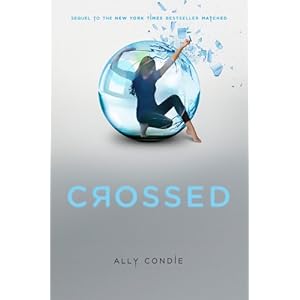
Ally Condie's Matched was published in November 2010 to great success. While her debut novel (the first in a trilogy) reads mostly like any another dystopian novel, I think Condie makes a powerful political statement.
Matched takes place in a strict government society in (where else) post-Apocalyptic America. Everything has been devised by scientific formula. The government sends you your food, your career, and your partner. No one eats the same thing because no one needs the exact same number of vitamins. The career that makes most effecient sense based on your body's strengths and weaknesses is given to you. And no one has a say in life mates - at age seventeen, all teens are "matched." That is to say, they are all placed with the respective man or woman (no room for queer folks in this book, which is aggravating) with whom the most healthy offspring can result.
The main character, Cassia, is faced with an interesting scenario. She is accidentally matched with two boys - her best friend, Xander, and a mysterious stranger, Ky. While the first is a great guy, the second becomes a new friend. Both understand and love Cassia. She must discover the right thing to do, whether it is legal or not.
As a whole, I am fiercely opposed to most of this book. This is a man/woman society only. There are no allusions to queer citizens, and no seeming issues with this rule. The author presents a roomful of giggling girls who get dressed up in fancy gowns and cannot wait to see the handsome man they are to wed. Jane Austen and I are nursing our aching eyes.
On top of that, Condie presents the reader with the most stereotypical situation known to teenage pop culture. Nice girl with a nice boyfriend meets an attractive, enigmatic stranger and must decide what to do: stick with the man she knows or pursue the man she wants to know. This relationship - not the abusive, manipulative government - consumes Cassia's thoughts. This love triangle is the driving force for change. Condie has surrendered her script to a patriarchal society, and that is a shame.
Gender roles temporarily aside, I am satisfied with what Condie has done with the source of passion. In this world of no questions, the author has given the protagonist a choice. Maybe the first choice of her entire life. And the choice is not between good and evil - it's between good and good. Between two potential life partners. Once Cassia is faced with this initial choice, more moral questions are thrown in her tracks. She must choose. Not knowing the outcome, not knowing whose life could potentially be at risk, Cassia is given the responsibility and agency to choose.
In a recent interview with the Los Angeles Times, Condie spoke about the importance of a woman's - or simply a young adult's - choice. "It's one thing to say, 'I choose love, I choose freedom,'" Condie said. "But we need to see her doing something about that." Choice is not only about verbal affirmation, but about action. Condie's characters start to take action; even Cassia's complacent mother begins to take initiative. Once Cassia decides that a life of independence is what she wants, she begins to take small steps toward that goal with the help of those around her. The desire for change drives and unites that team of folks.
Matched ends with Cassia's multitude of decisions and the repercussions of each. The reader is left with Cassia secretly on the prowl for the elements of her new life - mainly, Ky, which is how Crossed (Condie's sequel) opens. While Matched was only in Cassia's voice, the second novel is written from the perspective of both Cassia and Ky, who are seeking in each other in a new and foreign land. Listen to Condie talk about the two books here.
The Compulsive Reader promises that Crossed is a "much more philosophical and thoughtful book" than its predecessor. I hope that means the women in Condie's second novel drop the damsel in distress theme, which they have begun to do so towards the end of the first. The cover art already speaks volumes about change - while Matched displays Cassia trapped in a bubble, Crossed depicts the protagonist bursting through that bubble, demanding freedom.
I recognize that not every author can tackle every social issue - so maybe this wasn't the trilogy to engage in a political conversation regarding sexuality, although I feel Condie could have easily hinted towards such in small ways. That aside, it looks like Crossed contains a much more independent, questioning, and strong central character than Matched did.
Crossed hit stores today. Buy a copy at Amazon or Barnes & Noble.
No comments:
Post a Comment